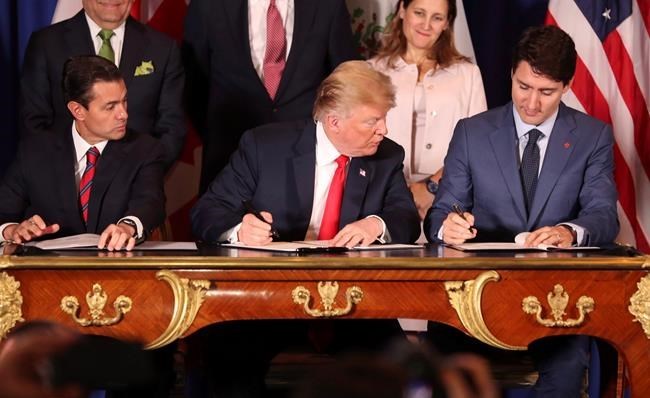
President Donald Trump, centre, looks over at Prime Minister Justin Trudeau's document as they and Mexico's President Enrique Pena Nieto sign the new United States-Mexico-Canada Agreement in Buenos Aires, Argentina, Friday, Nov. 30, 2018. THE CANADIAN PRESS/AP-Martin Mejia
Republished June 28, 2023 - 11:56 AM
Original Publication Date June 28, 2023 - 1:06 AM
WASHINGTON - A progressive public policy think tank is urging the federal government to side against oil and gas transmission giant TC Energy in its ongoing dispute with the United States over the ill-fated Keystone XL project.
The Calgary-based company is seeking to recoup US$15 billion in lost revenue from the on-again, off-again cross-border pipeline expansion, which President Joe Biden killed off for good in 2021 on his first day as commander-in-chief.
The lawsuit is based on the investor-state dispute rules in the now-expired NAFTA, as well as that deal's successor, the U.S.-Mexico-Canada Agreement, which included a three-year extension of those rules for so-called "legacy" investors.
A new report to be released Wednesday by the Canadian Centre for Policy Alternatives recommends Ottawa back the U.S. defence: that TC Energy has no legal recourse under North American trade rules, past or present.
"Though the TC Energy dispute pits a Canadian company against the U.S. state, it does not follow that it is in Canada's interest for TC Energy to prevail," the report reads.
Rather, it argues, the case represents an important chance for both governments to defend their ability to pursue climate-friendly public policy without being forced to "unjustly" enrich impacted investors.
"The Keystone XL case is a clear example of a company wanting to be compensated for making a risky bet," wrote senior researcher Stuart Trew and Queen's University professor Kyla Tienhaara, the report's co-authors.
The gamble, they say, was on the 2020 re-election of former president Donald Trump, who championed and resurrected the project in 2017 after it had been rejected by the Obama administration two years earlier.
"This bet didn't play out."
Ottawa is keeping tabs on the Keystone XL case, said Shanti Cosentino, a spokesperson for International Trade Minister Mary Ng. But she equivocated on the question of whether the government would pick a side.
"We are actively monitoring this case and expect this dispute to play out through the legal mechanisms established," Cosentino said in a statement.
"This government has always and will continue to advocate for Canadian commercial interests abroad."
The dispute is being heard by the International Centre for Settlement of Investment Disputes, a World Bank offshoot based in Washington, D.C., that registers dozens of investor-state clashes from around the globe each year.
At the moment, it's about jurisdiction: TC Energy wants to apply the now-defunct investor-state dispute settlement mechanism in NAFTA, which expired in 2020, since the project traces its lineage as far back as 2008.
The company hopes to use a three-year grace period for NAFTA disputes that was included in the new USMCA, known in Canada as CUSMA. By the report's count, some 15 investors including TC Energy lodged their disputes after NAFTA expired but before the grace period ended April 30.
Five of those cases, including Keystone XL, are based on alleged violations of NAFTA rules that occurred after the agreement expired — in TC Energy's case, Biden's decision to withdraw the presidential permit in January 2021.
The U.S., however, is arguing that the grace period was not intended as a "sunset clause" for NAFTA disputes, but "an orderly way to resolve prior disputes" that were left outstanding after the deal's expiration.
"The U.S. argues that, had the CUSMA parties wanted to simply extend NAFTA's investment rules and ISDS procedures for another three years, they would have done so through a boilerplate sunset clause," the report says.
TC Energy is disputing that interpretation, arguing it hasn't been floated before and that there is no evidence to suggest that U.S., Canadian and Mexican negotiators envisioned anything other than a sunset clause for resolving disputes.
There is more at stake than just TC Energy's eye-popping damages claim, the report says: An early dismissal of the suit would mitigate the ongoing cost of the global energy transition, not just for the U.S. but the rest of the planet.
A host of other legacy cases under the USMCA rules are still outstanding, and amount to compensation claims in excess of US$23 billion.
"This is why Canada’s next move, and that of Mexico, is so important," the report says.
"A win for TC Energy would send a devastating message to countries around the world, most of which cannot afford to finance the transition to clean energy while also paying off the fossil fuel industry."
Canada has two options to influence the tribunal, the report notes.
One is to work with the U.S. and Mexico on an official, binding interpretation of the rules from the USMCA Free Trade Commission, while the other would be a "non-party submission" directly to the tribunal itself.
"Due to the novelty of the U.S. argument and its fundamental importance to the operation of the CUSMA, a no-show from Canada at this stage of the arbitration would signal to the tribunal that the U.S. position on the legacy provisions is not credible," the report says.
"It would also demonstrate that the government is more interested in bowing to the interests of the oilpatch than in the correct interpretation of treaties."
This report by The Canadian Press was first published June 28, 2023.
News from © The Canadian Press, 2023